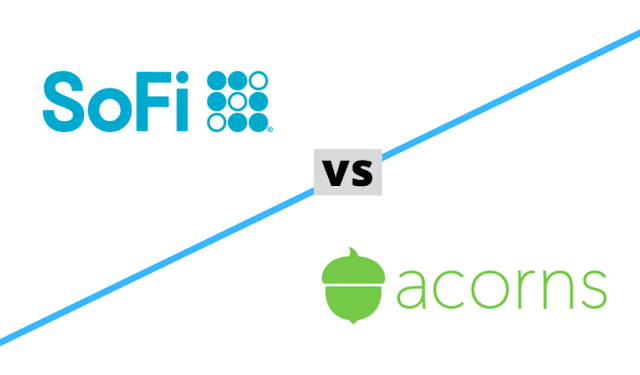SoFi Invest vs Acorns: Which is Suitable for You?
Investing has become increasingly accessible to individuals thanks to platforms like SoFi Invest and Acorns. Both offer unique features and services to suit different investment goals and preferences. In this article, we will compare SoFi Invest and Acorns and highlight the key differences and similarities to help you make an informed decision.
Features and services provided by SoFi Invest
SoFi Invest offers a comprehensive range of investment options to meet the various needs of investors. From traditional stocks and ETFs to cryptocurrencies, SoFi Invest offers diverse avenues to grow your portfolio. Additionally, the auto-invest feature allows users to set up regular investments based on their preferences. The introduction of Stock Bits further democratizes investing by allowing users to purchase fractional shares for as little as $1.
Features and services provided by Acorns
Acorns, on the other hand, focuses on small investments and encourages users to invest their spare change. Through its Roundup feature, Acorns automatically invests your spare change from everyday purchases into a diversified portfolio. Additionally, Acorns offers automated portfolio management, making it ideal for hands-off investors. Acorns Later allows users to save for retirement by offering Individual Retirement Accounts (IRAs).
Compare fees and prices
When it comes to fees, SoFi Invest offers commission-free trading in stocks, ETFs, and cryptocurrencies. However, users should note that cryptocurrency transactions may incur additional fees. Acorns, on the other hand, operates on a subscription-based model, with fees starting at $1 per month for a basic investment account. For Acorns Later and Acorns Spend accounts, additional features incur higher subscription fees.
Investment strategy and portfolio
SoFi Invest offers a variety of pre-built portfolios tailored to different risk appetites and investment goals. These portfolios are managed by professional advisors and designed to provide diversification and long-term growth potential. Acorns also offers a diversified portfolio, but its investment approach is more passive and focuses on ETFs and index funds.
User experience and interface
SoFi Invest has a user-friendly interface with intuitive navigation, making it easy for both beginners and experienced investors to manage their portfolios. Known for its sleek and minimalist design, Acorns offers a similarly user-friendly experience. Its mobile app is especially popular among Millennial and Gen Z users.
Educational resources and tools
SoFi Invest does more than just provide investment services. We also provide educational resources to help users make informed financial decisions. SoFi Invest provides users with the knowledge they need to navigate the financial markets, from beginner's guides to advanced investment strategies. Acorns, on the other hand, offers the Found Money program where users can earn cashback rewards when shopping with her Acorns partners.
Customer support and accessibility
Both SoFi Invest and Acorns prioritize customer satisfaction and offer responsive customer support channels. SoFi Invest provides support through phone, email, and live chat, ensuring users have access to help whenever they need it. Acorns also offers strong customer support with a dedicated help center and live chat feature.
Security measures
Security is paramount when it comes to investing, and both SoFi Invest and Acorns prioritize the safety of their users' funds and personal information. SoFi Invest employs industry standard encryption protocols and two-factor authentication to secure user accounts. Acorns uses advanced security measures such as encryption and biometric authentication to protect user data.
Pros and cons of SoFi Invest
Strong Points:
- Diverse investment options including virtual currencies
- Commission-free trading
- User friendly interface
Cons:
- Limited customer support options
- Cryptocurrency transactions may incur additional fees
Advantages and disadvantages of acorns
Strong Points:
- Simple investment with Roundup feature
- User friendly mobile app
- Found Money program offers cashback benefits
Cons:
- Subscription-based pricing model
- Portfolio customization options are limited
Compare customer reviews
Customer reviews play an important role in assessing the overall satisfaction and performance of an investment platform. Both SoFi Invest and Acorns have received positive reviews for their ease of use and innovative features, but some users have expressed concerns about fees and customer support.
Decision-making factors
When choosing between SoFi Invest and Acorns, you'll need to consider several factors, including your investment goals, risk tolerance, and preferred investment strategy. If you prioritize a wide range of investment options and commission-free trading, SoFi Invest may be a better choice. However, if you prefer a hands-off approach to investing and enjoy earning cashback rewards, Acorns might be more suitable for your needs.
Conclusion
In conclusion, both SoFi Invest and Acorns offer unique features and services designed to make investing accessible to everyone. Whether you're a seasoned investor or just starting, these platforms provide valuable tools and resources to help you grow your wealth. Ultimately, the best choice depends on your individual financial goals and preferences.
FAQs
Can I invest in cryptocurrencies on Acorns?
No, Acorns does not currently support cryptocurrency trading.
Does SoFi Invest offer retirement accounts?
Yes, SoFi Invest offers Individual Retirement Accounts (IRAs) for retirement savings.
Are there any hidden fees with Acorns?
Acorns fees are transparent, and there are no hidden charges.
Can I access my SoFi Invest account from multiple devices?
Yes, SoFi Invest is accessible from both desktop and mobile devices.
How often does Acorns rebalance portfolios?
Acorns automatically rebalances portfolios regularly to maintain the desired asset allocation.

